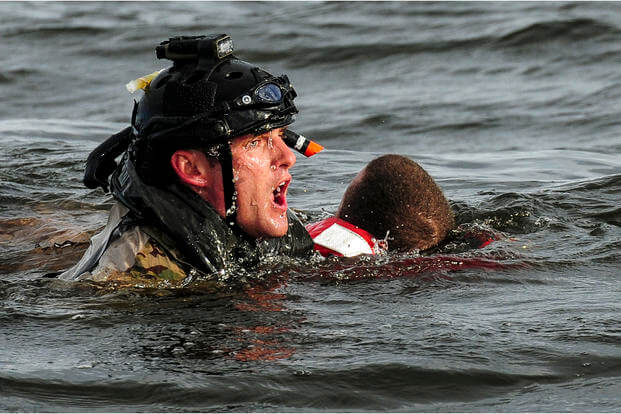There will come a day when your physical abilities and rescue skills will be required to save your life, your buddy's life or the life of someone you are trying to help.
Navy and USMC search and rescue swimmers, Coast Guard helicopter rescue swimmers, Air Force pararescue and combat medics from all military services are required to develop an elite set of rescue skills in those jobs.
It's also true that the journey into the tactical professions (military, police, firefighting, EMT) must include the realization that these skills are necessary for all tactical profession personnel and not just for the rescue teams or medics.
Treating yourself like a tactical athlete or, better yet, a rescue athlete will help to maintain your physical and emergency medical skills at ready state.
Jobs such as rescue swimmer, rescue diver and pararescue specifically train for these rescue events as everyday duties throughout their careers. Though these types of rescue emergencies do not occur every day for each of the rescue operators, someone must be ready when they do.
Are you "always prepared," as the Coast Guard motto "Semper Paratus" states?
Air Force Special Warfare (Pararescue/PJ) has the following creed:
"It is my duty as a Pararescueman to save life and aid the injured. I will be prepared at all times to perform my assigned duties quickly and efficiently, placing these duties before personal desires and comforts. These things I do, that others may live."
Just to drive home the importance of this mission, many logos throughout the pararescue community hold the last sentence in particularly high importance: "These things I do, that others may live."
Rescue swimmers and combat medics in other military services also have the "so others may live" quote on their patches and clothing. It is a creed for people who specialize in the emergency rescue arts, but personnel with other jobs in the tactical professions should fill in before the medics arrive and also save lives. Are you training to save another?
Before You Join, Start Training
How important is being physically prepared when you join the military, police, firefighting or EMT professions? It is literally a matter of life and death.
One day, your physical abilities will be tested at work, off duty or in your own home. If you're going to be an asset in such situations, start with your own physical health, abilities and tactical training.
Joining as an out-of-shape candidate can lead to overuse injuries (tendinitis; rhabdomyolysis -- a breakdown of muscle tissue, causing damaging protein to be released into the blood; shin pain; etc.) from the beginning when going through boot camp, basic training or police/fire academies.
You do not have to be an athlete to possess above-average fitness, but you must work hard to get conditioned as if your life or your buddy's life depended on it.
It can take several months to build the foundation of fitness necessary to keep you from getting hurt during training and possess the ability to meet the standards required. Start preparing by checking out the Military.com Fitness Article section for ideas on all aspects of being a better-trained tactical athlete.
Often, the excuse many use is that they just cannot find the motivation to train. I do not have a perfect answer to that specific issue, but if you cannot find the motivation to train your body so you will be an asset and not a liability in emergency situations, you may want to reconsider the specific job you say you want.
It is no one's job to motivate you to serve your country or community but your own. Do not look outside for motivation to serve. There is nothing wrong with motivation and being inspired to serve, but eventually your motivation has to evolve into discipline.
Serving is a calling. Motivation and determination should come from within. Sure, you can be inspired, learn from and be coached by others, but the reason why you show up every day to "train even though you do not feel like it" is up to you.
Remember, it is an honor and a privilege to serve alongside your brothers and sisters in any tactical profession. You owe it to them to be at your best. Accidents happen, and your job may take you into harm's way or your best friend might need help. Focus on being a better recruit by taking your fitness and training seriously.
Related articles:
Stew Smith is a former Navy SEAL and fitness author certified as a Strength and Conditioning Specialist (CSCS) with the National Strength and Conditioning Association. Visit his Fitness eBook store if you're looking to start a workout program to create a healthy lifestyle. Send your fitness questions to stew@stewsmith.com.
Want to Learn More About Military Life?
Whether you're thinking of joining the military, looking for fitness and basic training tips, or keeping up with military life and benefits, Military.com has you covered. Subscribe to Military.com to have military news, updates and resources delivered directly to your inbox.





















